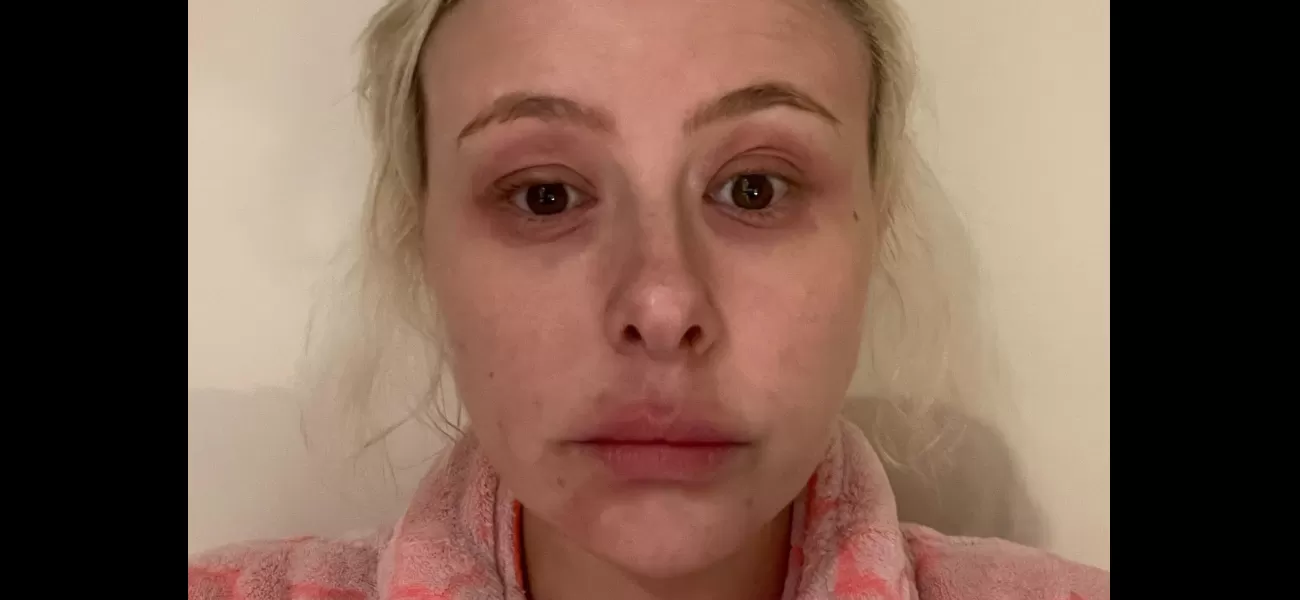Eczema was a major issue for me, but I finally discovered a skincare regimen that has been incredibly effective.
Fixing both inside and outside.
March 8th 2024.

When my eczema is at its worst, it can cause these angry red rings around my eyes. It's not a pleasant experience, but unfortunately, I am not alone in this struggle. As an estimated 1.5 million adults in the UK also suffer from eczema. For me, it can range from a few dry patches here and there to painful rashes that cover my entire body. Like many others in the adult eczema community, I have been dealing with this condition since I was a child. I have spent countless hours trying to resist the urge to scratch and finding ways to cover up the flaky, red blotches on my skin.
If you go to the doctor for eczema, they will most likely prescribe you with a steroid cream and a petroleum-based emollient. While these can be helpful in small doses, they can also have negative side effects if used too frequently. As someone who has been slathering on these doctor-recommended creams for years, I can confidently say that they don't work for everyone. Even after trying numerous brands and types, I still couldn't find any relief.
Last year, during a particularly severe flare-up, I decided that enough was enough. I was tired of doing the same thing over and over and expecting a different result. So, I made the brave decision to become my own guinea pig and break the cycle that eczema had on my skin. The flare-up was so bad that it produced angry rings around my eyes and left my neck, elbows, and hands cracked and bleeding. I started to suspect that my diet and stress levels may have played a role in this outbreak.
This led me down a path of researching how our internal health can affect our external appearance. I discovered that people with eczema tend to have different bacteria in their gut and sometimes experience inflammation in their digestive tract. This got me wondering if eczema is curable. The answer is no, as it is a chronic condition that can be managed but not permanently eliminated. Our genetics and immune system play a significant role in whether we develop eczema or not.
According to SK:N Clinics Dermatologist Dr. Aiza Jamil, there is a connection between our gut, brain, and skin known as the "gut-brain-skin axis." Changes in our gut microbiome can impact our skin, and vice versa. This is where probiotics come in. Probiotics are live microorganisms that can provide health benefits when consumed in adequate amounts. Studies have shown that probiotics may have a positive impact on eczema symptoms, especially in infants and children. They can help regulate the immune system, reduce inflammation, and contribute to a healthier gut microbiome.
With this newfound knowledge, I decided to try Hanna Sillitoe's Multi Strain Biotic, a blend of fifteen different bio-live cultures designed to support a healthy gut microbiome. While it was not cheap at £35 a bottle, the positive results from other users convinced me to give it a go. I started taking a tablespoon of the vinegary liquid every morning, and although the results were not immediate, I began to notice a significant improvement in my rashes. I no longer had to rely on steroid cream, and I haven't had a flare-up since.
But, the Multi Strain Biotic was not the only thing that helped improve my eczema symptoms. I also followed a strict routine of cleansing and moisturizing, using different lotions and potions and eliminating anything that aggravated my skin or made no difference. I learned that soap can dry out eczema-prone skin, so I stuck to creamy cleansers for my face and SLS-free shower gels for my body. Although you are supposed to use emollient washes, I found that they left a greasy residue that only made me itch more.
I also discovered some go-to products that worked wonders for my skin. These included Liz Earle Cleanse & Polish and Lush Ultrabland for cleansers, Curél Deep Moisture Spray and Caudalie Grape Water Spray for toners, serums, and mists, and Emma Lewisham Supernatural Face Crème Riche and Thayers Barrier Bestie Cream for facial moisturizers. For body moisturizers, La Roche-Posay Lipikar AP+M, O'Keeffe's Skin Repair Body Lotion, and Cetraben Pro Hydrate Five Intensely Hydrating Body Cream were my top picks.
I began incorporating products with proven effective ingredients like Centella, snail mucin, and squalane into my routine. I also developed habits such as spritzing my face between skincare steps, using oil or balm after my body lotion has absorbed, and wearing a satin eye mask to reduce irritation around my eyes. Most importantly, I listened to my skin and paid attention to how it reacted to different products. I found that some holy grail ingredients like hyaluronic acid and aloe vera actually irritated my skin, while fragranced products and liquid exfoliants caused no issues.
This taught me that what works for one person may not work for another, so it's essential to experiment and find what works best for your skin. According to Dr. Jamil, a combination of regular moisturizing, wearing loose clothing, managing stress, and being mindful of the products you use can help manage eczema flare-ups. However, if you have tried everything and are still struggling, seek professional advice from a dermatologist. They can provide a personalized treatment plan and prescribe medications if necessary.
If you go to the doctor for eczema, they will most likely prescribe you with a steroid cream and a petroleum-based emollient. While these can be helpful in small doses, they can also have negative side effects if used too frequently. As someone who has been slathering on these doctor-recommended creams for years, I can confidently say that they don't work for everyone. Even after trying numerous brands and types, I still couldn't find any relief.
Last year, during a particularly severe flare-up, I decided that enough was enough. I was tired of doing the same thing over and over and expecting a different result. So, I made the brave decision to become my own guinea pig and break the cycle that eczema had on my skin. The flare-up was so bad that it produced angry rings around my eyes and left my neck, elbows, and hands cracked and bleeding. I started to suspect that my diet and stress levels may have played a role in this outbreak.
This led me down a path of researching how our internal health can affect our external appearance. I discovered that people with eczema tend to have different bacteria in their gut and sometimes experience inflammation in their digestive tract. This got me wondering if eczema is curable. The answer is no, as it is a chronic condition that can be managed but not permanently eliminated. Our genetics and immune system play a significant role in whether we develop eczema or not.
According to SK:N Clinics Dermatologist Dr. Aiza Jamil, there is a connection between our gut, brain, and skin known as the "gut-brain-skin axis." Changes in our gut microbiome can impact our skin, and vice versa. This is where probiotics come in. Probiotics are live microorganisms that can provide health benefits when consumed in adequate amounts. Studies have shown that probiotics may have a positive impact on eczema symptoms, especially in infants and children. They can help regulate the immune system, reduce inflammation, and contribute to a healthier gut microbiome.
With this newfound knowledge, I decided to try Hanna Sillitoe's Multi Strain Biotic, a blend of fifteen different bio-live cultures designed to support a healthy gut microbiome. While it was not cheap at £35 a bottle, the positive results from other users convinced me to give it a go. I started taking a tablespoon of the vinegary liquid every morning, and although the results were not immediate, I began to notice a significant improvement in my rashes. I no longer had to rely on steroid cream, and I haven't had a flare-up since.
But, the Multi Strain Biotic was not the only thing that helped improve my eczema symptoms. I also followed a strict routine of cleansing and moisturizing, using different lotions and potions and eliminating anything that aggravated my skin or made no difference. I learned that soap can dry out eczema-prone skin, so I stuck to creamy cleansers for my face and SLS-free shower gels for my body. Although you are supposed to use emollient washes, I found that they left a greasy residue that only made me itch more.
I also discovered some go-to products that worked wonders for my skin. These included Liz Earle Cleanse & Polish and Lush Ultrabland for cleansers, Curél Deep Moisture Spray and Caudalie Grape Water Spray for toners, serums, and mists, and Emma Lewisham Supernatural Face Crème Riche and Thayers Barrier Bestie Cream for facial moisturizers. For body moisturizers, La Roche-Posay Lipikar AP+M, O'Keeffe's Skin Repair Body Lotion, and Cetraben Pro Hydrate Five Intensely Hydrating Body Cream were my top picks.
I began incorporating products with proven effective ingredients like Centella, snail mucin, and squalane into my routine. I also developed habits such as spritzing my face between skincare steps, using oil or balm after my body lotion has absorbed, and wearing a satin eye mask to reduce irritation around my eyes. Most importantly, I listened to my skin and paid attention to how it reacted to different products. I found that some holy grail ingredients like hyaluronic acid and aloe vera actually irritated my skin, while fragranced products and liquid exfoliants caused no issues.
This taught me that what works for one person may not work for another, so it's essential to experiment and find what works best for your skin. According to Dr. Jamil, a combination of regular moisturizing, wearing loose clothing, managing stress, and being mindful of the products you use can help manage eczema flare-ups. However, if you have tried everything and are still struggling, seek professional advice from a dermatologist. They can provide a personalized treatment plan and prescribe medications if necessary.
[This article has been trending online recently and has been generated with AI. Your feed is customized.]
[Generative AI is experimental.]
0
0
Submit Comment





